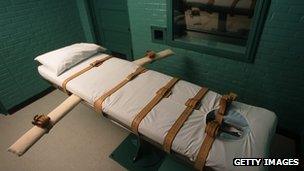FDA goes to court to secure drugs for lethal injections
- Published

The death chamber in Huntsville, Texas
The US Food and Drug Administration is going to court to secure supplies of a drug used in lethal injections.
Sodium thiopental is used in many states to anaesthetise prisoners before the administration of other chemicals that extinguish life.
However supplies have dwindled in the US after a judge banned its importation in March.
Campaigners against the death penalty say the restrictions have forced a slowdown in the rate of executions.
The last US manufacturer of sodium thiopental ceased production in 2009. Since then the drug has been imported mainly from companies within the European Union. Several states purchased supplies from a UK based firm called <link> <caption>Dream Pharma</caption> <url href="http://www.bbc.co.uk/news/uk-12263460" platform="highweb"/> </link> , run from a driving school in west London.
But these companies have in turn stopped delivering to the US as the European Union cracked down on the export of medicines that can be used in executions.
Legal confusion
In March of this year a US district judge upheld a case brought by 21 prisoners on death row who argued that the FDA didn't have the right to allow prisons to import the drug without ensuring that it would work effectively.
However under pressure from many of the 33 states that use the lethal injection method, the FDA is appealing that ruling. Experts say it is likely to take a couple of months to resolve. And either side could then appeal to the Supreme Court which may take a year to come to a decision.
According to Maya Foa from Reprieve, a group that campaigns against the death penalty, the legal confusion and the shortage of supplies have led to a slowdown in executions.
"There have certainly been shortages which have caused many states to slow the rate of executions. It's also raised the cost - There have been moratoria over the past year and a half while states scramble to find more drugs," she told ┤¾¤¾┤½├¢ News.
Richard Dieter, executive director of the US based Death Penalty Information Center, agrees that the legal confusion over the status of sodium thiopental is having some effect on executions.
"It's slowed things down somewhat but the big states have enough supplies to keep going."
One dose left
The state of Oklahoma has the highest rate of executions per capita in the US. It uses a different drug called pentobarbital. This has been used in the treatment of medical disorders including anxiety. But restrictions placed on supplying it for lethal injections by the manufacturers mean that, following the execution of Michael B Selsor at the beginning of May, the state is running low.
Jerry Massie, a spokesman for the Oklahoma department of corrections acknowledged the state has only one dose of pentobarbital left.
"The problem is that companies don't want to sell it to prisons. We're still looking at options but we haven't made a decision on an alternative yet."
One state that has made a decision on an alternative is Missouri. They have decided to use Propofol as an anaesthetic agent in future executions. An overdose of the drug caused the death of pop star Michael Jackson. In a written statement the Missouri department of corrections acknowledged that shortages of other drugs had forced their hand.
"The one-drug protocol replaces the state's previous three-drug protocol. This change became necessary due to the unavailability of sodium thiopental, one of the three drugs used under the previous protocol."
Some critics of the death penalty are concerned that propofol has never been used for executions before. Richard Dieter from the Death Penalty Information Center says that isn't really the issue.
"There's lots of anaesthetics out there, if you give enough of it you can kill someone," he said.
The legal and commercial restrictions on drugs used in executions are not just affecting US states. In July of last year Vietnam decided to switch to lethal injection but despite having more than 400 prisoners on death row, no one has been executed since. Officials in the Ministry of Public Security were quoted as saying that getting supplies of the drugs needed for lethal injections has proved difficult.
Many states have chosen to use the lethal injection because they believe it to be a more humane method than alternatives such as hanging or the electric chair. And according to Maya Foa from Reprieve they will be very reluctant to go back to these methods
"There's a sort of medical veil pulled over executions which prisons and states which are pro capital punishment like, they need that to hide the reality of what is actually a barbaric practice," she told ┤¾¤¾┤½├¢ News.
I think they would be unlikely to go back to hanging or electrocution because that forces the public to witness the reality of putting a man to death and that's something that actually repels a lot of people and would increase the anti-capital punishment sentiment out there and that's a risk I think that prisons and states are unwilling to take."